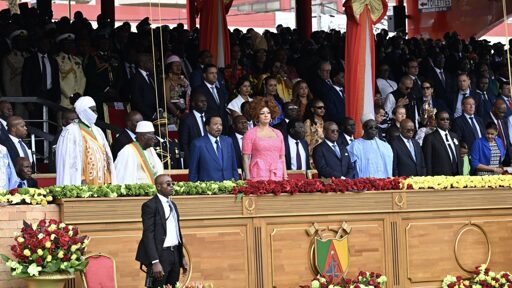Cameroon’s President Paul Biya, Africa’s longest-serving leader, has declared his candidacy for an eighth term in the presidential elections set for later this year. The 92-year-old leader, in power since 1982, confirmed his intent to run on July 13 as the presidential flagbearer of the ruling Cameroon People’s Democratic Movement (CPDM), a party he has led for over four decades.
Biya’s announcement comes at a time when Cameroon is grappling with deep political divisions, mounting insecurity, and economic challenges. His prolonged rule has been characterized by a centralized power structure, electoral controversies, and suppression of dissent that analysts say have weakened the country’s democratic institutions.
Read more: Cameroonian security forces launch yet another crackdown on opposition
On X, President Paul Biya declared, “I am a candidate in the presidential election of October 12, 2025. Rest assured, my determination to serve you matches the gravity of the challenges we face.”
Political crisis and anglophone conflict
Biya’s announcement is as shocking as it is unsurprising. For nearly a decade, Cameroon has been engulfed in a violent separatist insurgency in its English-speaking Northwest and Southwest regions, a conflict fuelled by deep-seated grievances over marginalization by the Francophone-dominated government. The crisis left thousands dead and by 2024, more than one million Cameroonians were displaced. The same year, nearly 3 million people faced acute food insecurity due to years of conflict, displacement, and climate shocks. Despite the devastating toll, the Biya administration has clung to a military-first strategy that has failed to deliver lasting peace or meaningful dialogue.
With Cameroon ranked among the world’s poorest nations and weighed down by systemic corruption, insecurity, and economic stagnation, many are left questioning what new vision, if any, Biya offers after 43 years in power.
Succession crisis
Biya’s decision to seek re-election has reignited debates over leadership renewal in Cameroon. At 92, his physical frailty and rare public appearances have led to growing speculation about a looming succession crisis. Yet, within the CPDM and state apparatus, Biya remains the undisputed power center.
With age not on his side and given the presidential term is 7 years, speculation over President Biya’s potential successor keeps emerging. Among the mentioned is Franck Biya, the president’s son, whose quiet but notable rise within Cameroon’s political and business circles has fuelled rumors of a dynastic transition.
Another key figure is Ferdinand Ngoh Ngoh, the powerful Secretary-General at the Presidency, Ngoh Ngoh, who often operates as a gatekeeper to the president, is reportedly consolidating his position by spearheading political initiatives and campaigning on Biya’s behalf – a role that at times overshadows even the Prime Minister.
On the opposition front, Maurice Kamto, leader of the Cameroon Renaissance Movement (CRM), remains a key political figure despite a fragmented opposition. However, repeated crackdowns on dissent and a restrictive political environment have hampered the opposition’s ability to mount a unified challenge.
But under Cameroon’s constitution, should the presidency fall vacant before the end of a term, the president of the senate is mandated to assume the role on an interim basis. Yet, with Biya’s grip on power and Cameroon having had only two presidents since independence in 1961, questions over the prospects for a genuine political transition, whether through constitutional means or orchestrated by the ruling elite, persist.
The post At 92, Paul Biya declares eighth presidential bid to lead Cameroon appeared first on Peoples Dispatch.
From Peoples Dispatch via this RSS feed


